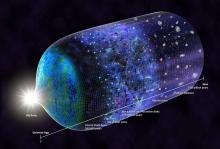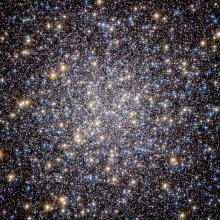Listen to today's episode of StarDate on the web the same day it airs in high-quality streaming audio without any extra ads or announcements. Choose a $8 one-month pass, or listen every day for a year for just $30.
You are here
Dark Skies
As the Sun drops below the horizon this evening, the sky will grow darker. Eventually, it’ll turn almost black — especially from locations away from the pesky glow of city lights.
For several centuries, though, scientists wondered why the night sky turns dark.
Most scientists thought the universe was infinite in both time and space. In other words, there was no point in time when the universe began, and it extended without end in every direction. If so, then we'd eventually see a star at every single point in the sky. That would make the night sky as bright as the Sun.
In the last century, though, astronomers realized that the universe isn't infinite. It began 13.8 billion years ago, in the Big Bang, so it’s not infinite in time.
And our view of the universe isn’t infinite, either. Because the speed of light is limited, there hasn't been enough time for us to receive light from stars that are more than 13.8 billion light-years away. So we see only a bubble of space, known as the observable universe.
So while we see lots of stars in the night sky, we also see lots more empty space — making the night sky dark.
If our eyes were attuned to microwaves, though, the sky would be bright. The afterglow of the Big Bang fills the entire universe. At the time it was produced, that energy was at visible wavelengths. But because the universe is expanding, the light waves have been stretched to longer wavelengths — invisible to the human eye.
Script by Damond Benningfield





